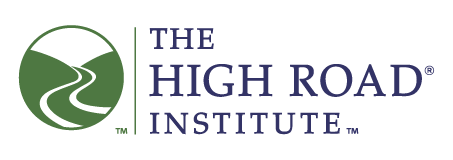
Every year, I get the privilege of speaking in front of many people on various aspects of High Road® leadership. Quite often, I am asked this question: “Whose leadership philosophy or model do you follow?” The person then offers examples of leadership gurus such as Lois Frankel, Robert Greenleaf, or John Maxwell.
I realize that what the person is really asking is: Where did I get my theory or model of ideal leadership? The driver behind why some want to know this about me are based on two myths about leadership.
Myth #1: You can learn how to lead by reading enough books.
The reality is that to learn how to lead, you must lead. Trial and error will teach you the most about what it means to lead people.
People are unpredictable and situations are usually dynamic. Therefore, while you can gain perspective and research principles of leading by reading, you will not grasp the full meaning of leading until you hold the reins of leadership for a long period of time.
Myth #2: Leading others well must be based upon a widely accepted philosophy.
The reality is that each leader develops his or her style of leading based on many factors such as:
– the needs of the organization or team,
– role models,
– the profession they are in,
– their training,
– prior experiences and
– most important of all, the individual’s intrinsic internal values.
My leadership style and ‘philosophy’ grew through experiences, some positive and many disastrous. I studied the leaders in my life and observed what worked and did not. I read about the lives of great men and women―historical leaders―to understand their motivations and circumstances. Then, through the privilege of the platform, I carefully listened to the stories of thousands of reluctant leaders (some emerging and many experienced). These men and women openly shared their fears, concerns, and desires.
You could say I developed my leadership chops from doing R & D (research and development) on the playing field and the mean streets. Finally, after all those experiences I decided to study the models and wisdom of other leadership gurus, which added to my base of knowledge.
From this research, I noticed something that became my guide.
No matter who talks about good leadership, their philosophies condense down to thirteen universal principles. I will share six with you. From my personal values, I added a seventh principle to this list.
Universal Principles of Good Leadership
- Leadership is about people.
It is the people you lead that will decide if you know how to lead and the quality of your leadership.
- Leadership is about people.
As a leader, you cannot get anything accomplished without people. When you go it alone, you are not leading. Leadership is about an intimate relationship you have with each person you lead and the impact you have on them.
If there is a spotlight on you, as the leader, you need to ensure this light gets reflected on the people you are responsible for and are supporting you.
- Leadership is about beneficial results.
As leader, how well you lead is dependent upon the results you create and the methods you use. People are looking to you to get something started and bring it to fruition.
- Leadership is about accountability and responsibility.
A leader who does not hold himself or herself accountable is not worthy of following. You cannot hold anyone else accountable to standards and rules unless you demonstrate that you live up to those same expectations always.
If you want to be perceived as a good leader, you must accept that you are not only responsible for yourself, you are responsible for the lives, success, and growth of each person you lead.
- Leadership is about a role (vs. a job).
Most who are given the opportunity to lead are technical experts in their chosen field. This self-definition never leaves them and becomes a reason that he or she is perceived as a weak or reluctant leader.
Leading is a role you accept and your job duties or title are irrelevant. As a leader, people expect you to behave differently and communicate differently. You are on a pedestal and some are hoping you fall off. Always remember this adage: You are a leader first, technician/employee/expert second.
- Leadership is about a cluster of deep skills.
No leader is perfect. The leader is human and has flaws and weaknesses. However, good and great leaders rely on a cluster of related and interdependent skills to obtain desired results and make things happen.
As leader, you must know your skill cluster and use them to your advantage as you lead people and projects forward. Be sure to develop followers who can assist you in compensating for your weaknesses and less developed skills.
- Leadership is about taking the high road always.
I realize that l must always take the high road in dealing with people, situations, and business. When I take the high road, I know that no one will question my ethics or integrity.
We use the term ‘taking the high road’ to describe a person who chooses to avoid the slime and muck, whether it is in politics or business. I adopted that vision as my personal brand of leading and I encourage leaders and their followers to take the high road always.
